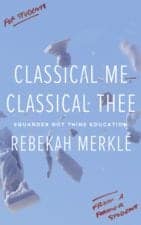For those who—unlike myself—function with tidy minds, I must begin by acknowledging that there was no Book of the Month/July 2017. This is because it was dark, they were big. It won’t happen again. Those responsible have been sacked.
And for this round, I want to do something a little different. I read this book in manuscript, and not in the fetchingly bound copy you see to the right here. It was written by Bekah Merkle, my daughter, which is how I had access to it in manuscript form. I don’t usually select books by family members as my book of the month selection because of, you know. But this book is important enough for me to make an exception.
So let me tell you what the book is about, the qualifications of the author for writing it, and the use I suggest for it.
The book is an explanation of classical Christian education, written from the perspective of a former recipient of this kind of education, with an intended audience of the currently enrolled recipients. The book is fairly short, pithy, funny, and wise. If classical Christian education is to be a real success, at some point in the process the students have to grow into an awareness of what is happening all around them, and in them, along with the profound nature of it all. To riff off Socrates, an unexamined education is not worth having.
Bekah is uniquely qualified to write this book. She was the occasion for the resurgence of this form of education in America. I have told the story many times, but here we go again. When Bekah was a toddler, Nancy one day said to me that she could not see handing Bekah over to someone we did not know, telling them to teach her about God, life, and everything else. At the time, I knew nothing about Christian education except the fact that I agreed with that. I told Nancy—somewhat rashly—not to worry because we would have a Christian school started by the time Bekah hit kindergarten. Well, by the grace of God, we did. That happened. Logos School opened her kindergarten year, and she went all the way through, K-12.
She did well on her national exam test scores, which meant that she started getting mailers from Christian colleges all over the country. From these brochures, I determined that the purpose of a college education, at least as far as Christians were concerned, was to eat pizza, ride horses, and make lifelong friends. Kind of like summer camp, only longer and more expensive. Nobody was trying to sell a true liberal arts education.
At this juncture, Nancy entered the picture again in order to inquire whether or not I had my leg tied to the piano. She put it nicer than that, of course, but the problem we were grappling with was that Bekah was all dressed up with no place to go. What were we going to do for college?
By the grace of God, New St. Andrews College opened up Bekah’s freshman year. So she was not only a student in the first classical Christian school, K-12, she was also a student in a classical Christian college, and a pioneering student in both of them. She now teaches literature to her own kids and others at Logos, and is married to Ben, the president of New St. Andrews. So she has seen this thing from pretty much every angle.
Which is why she explains it so well. Where there are foibles, she demonstrates her thorough knowledge of them. Where there are striking successes, she knows about them. Where there are temptations and pitfalls, she is on it.
Of course, I recommend the book as a book to simply read. But I would make a particular pitch to board members and headmasters. This is not a book for the people running the school to read, to then just put on the shelf. This is a book written for wide distribution among your secondary students. I recommend that schools buy this book by the case, and use it for promoting your school, encouraging your teachers, educating your parents, and establishing your students.
This book is the good business, and releases on August 22.


And for those who are uberinterested in the topic and want to get allllll the details on how Logos School got started, check out Non Nobis by Tom Garfield.
Two of the last eight books of the month have been by Rebekah Merkle, and you used the “I don’t do this often, but…” line on the last one, too. don’t get me wrong, I am very sure they are both quite worthy of the recommendation, but at some point, you don’t get to play the “I never do this,” card anymore and you have to just admit that you recommend these as often as your daughter writes them, ha ha.
Luke, you have a point of course. But consider it from my point of view . . . all the books my family members write that I *don’t* make book of the month . . .
Or look at it this way: Over five years of books of the month. Two by family members. They just happened to be chronologically fairly close.
Well, I was having my children read your book, Recovering the Lost Tools of Learning, for this very reason (to understand and appreciate their education). I guess I’ll switch to Bekah’s book now…
Pastor Wilson,
Would this bon be helpful to those like myself that use Classical Education for homeschooling? If not, any good sources similar to this to help someone like this? We are enrolling in Classical Conversations, and am reading “The Core” currently.